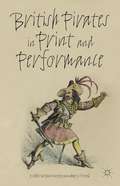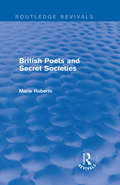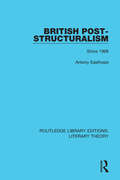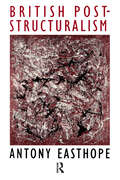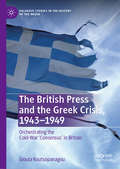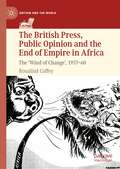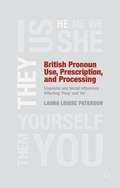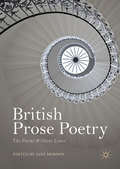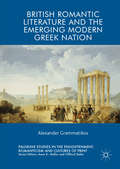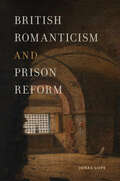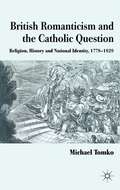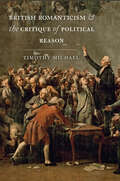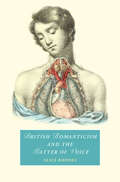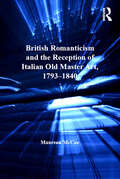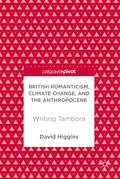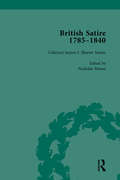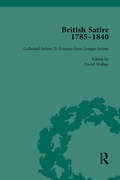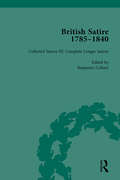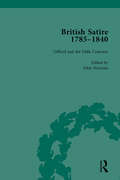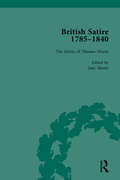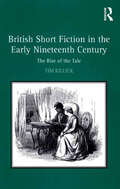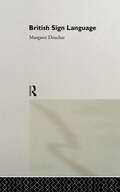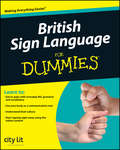- Table View
- List View
British Pirates in Print and Performance
by Frederick BurwickFictional or real, pirates haunted the imagination of the 18th and 19th century-British public during this great period of maritime commerce, exploration, and naval conflict. British Pirates in Print and Performanc e explores representations of pirates through dozens of stage performances, including adaptations by Byron, Scott, and Cooper.
British Poets and Secret Societies (Routledge Revivals)
by Marie Mulvey-RobertsA surprisingly large number of English poets have either belonged to a secret society, or been strongly influenced by its tenets. One of the best known examples is Christopher Smart’s membership of the Freemasons, and the resulting influence of Masonic doctrines on A Song to David. However, many other poets have belonged to, or been influenced by not only the Freemasons, but the Rosicrucians, Gormogons and Hell-Fire Clubs. First published in 1986, this study concentrates on five major examples: Smart, Burns, William Blake, William Butler Yeats and Rudyard Kipling, as well as a number of other poets. Marie Roberts questions why so many poets have been powerfully attracted to the secret societies, and considers the effectiveness of poetry as a medium for conveying secret emblems and ritual. She shows how some poets believed that poetry would prove a hidden symbolic language in which to reveal great truths. The beliefs of these poets are as diverse as their practice, and this book sheds fascinating light on several major writers.
British Political Culture and the Idea of 'Public Opinion', 1867-1914
by James ThompsonNewspapers, periodicals, pamphlets and books all reflect the ubiquity of 'public opinion' in political discourse in late nineteenth and early twentieth-century Britain. Through close attention to debates across the political spectrum, James Thompson charts the ways in which Britons sought to locate 'public opinion' in an era prior to polling. He shows that 'public opinion' was the principal term through which the link between the social and the political was interrogated, charted and contested and charts how the widespread conviction that the public was growing in power raised significant issues about the kind of polity emerging in Britain. He also examines how the early Labour party negotiated the language of 'public opinion' and sought to articulate Labour interests in relation to those of the public. In so doing he sheds important new light on the character of Britain's liberal political culture and on Labour's place in and relationship to that culture.
British Post-Structuralism: Since 1968 (Routledge Library Editions: Literary Theory Ser. #7)
by Antony EasthopeThrough this exploration of the relation between Marxism, post-structuralism and the theory of the subject, first published in 1988, Antony Easthope contrasts the degree to which post-structuralism has made a radical impact on English and American national cultures. This book reprints an important interview in which Jacques Derrida discusses the
British Post Structuralism
by Antony EasthopeFirst published in 1988. Through this exploration of the relation between Marxism, post-structuralism and the theory of the subject, first published in 1988, Antony Easthope contrasts the degree to which post-structuralism has made a radical impact on English and American national cultures.
The British Press and the Greek Crisis, 1943–1949: Orchestrating the Cold-War ‘Consensus’ in Britain (Palgrave Studies in the History of the Media)
by Gioula KoutsopanagouThis book provides the first detailed analysis of how interactions between government policy and Fleet Street affected the political coverage of the Greek civil war, one of the first major confrontations of the Cold War. During this period the exponential growth of media influence was an immensely potent weapon of psychological warfare. Throughout the 1940s the press maintained its position as the most powerful medium and its influence remained unchallenged. The documentary record shows that a British media consensus was more fabricated than spontaneous, and the tools of media persuasion and manipulation were extremely important in building acceptance for British foreign policy. Gioula Koutsopanagou examines how this media consensus was influenced and molded by the British government and how Foreign Office channels were key to molding public attitudes to British foreign policy. These channels included system of briefings given by the News Department to the diplomatic correspondents, and the contacts between embassies and the British foreign correspondents.
The British Press, Public Opinion and the End of Empire in Africa: The 'Wind of Change', 1957-60 (Britain and the World)
by Rosalind CoffeyThis book provides fresh insights into how the British press affected both British perceptions of decolonisation in Africa and British policy towards it during the ‘wind of change’ period. It also reveals, for the first time, the extent to which British newspaper coverage was of relevance to African and white settler readerships. British newspapers informed the political strategies and civic cultures of African activists,nationalists, liberal whites in Africa, the staunchest of white settler communities, and the first governments of independent African states and their opponents. The British press, British public opinion and British journalists became etched into the lived experiences of the end of empire affecting Anglo-African and Anglo-settler relations to this day. Arguing that the press cast a transnational web of influence over the decolonisation process in Africa, the author explores the relationships between the British, African and settler public and political spheres, and highlights the mediating power of the British press during the late 1950s. The book draws from a range of British newspapers, official government documents, newspaper archives, interviews, memoirs, autobiographies and articles printed in African and white settler papers. It will be of interest to historians of decolonisation, Africa, the media and the British Empire.
British Pronoun Use, Prescription, and Processing
by Laura Louise PatersonThis study considers the use of they and he for generic reference in post-2000 written British English. The analysis is framed by a consideration of language-internal factors, such as syntactic agreement, and language-external factors, which include traditional grammatical prescriptivism and the language reforms resulting from second-wave feminism.
British Prose Poetry: The Poems Without Lines
by Jane MonsonThis book is the first collection of essays on the British prose poem. With essays by leading academics, critics and practitioners, the book traces the British prose poem’s unsettled history and reception in the UK as well as its recent popularity. The essays cover the nineteenth, twentieth and twenty-first centuries exploring why this form is particularly suited to the modern age and yet can still be problematic for publishers, booksellers and scholars. Refreshing perspectives are given on the Romantics, Modernists and Post-Modernists, among them Woolf, Beckett and Eliot as well as more recent poets like Seamus Heaney, Geoffrey Hill, Claudia Rankine, Jeremy Over and Vahni Capildeo. British Prose Poetry moves from a contextual overview of the genre’s early volatile and fluctuating status, through to crucial examples of prose poetry written by established Modernist, surrealist and contemporary writers. Key questions around boundaries are discussed more generally in terms of race, class and gender. The British prose poem’s international heritage, influences and influence are explored throughout as an intrinsic part of its current renaissance.
British Romantic Literature and the Emerging Modern Greek Nation (Palgrave Studies In The Enlightenment, Romanticism And Cultures Of Print Ser.)
by Alexander GrammatikosBritish Romantic Literature and the Emerging Modern Greek Nation makes an original contribution to the field of British Romantic Hellenism (and Romanticism more broadly) by emphasizing the diversity of Romantic-era writers’ attitudes towards, and portrayals of, Modern Greece. Whereas, traditionally, studies of British Romantic Hellenism have predominantly focused on Europe’s preoccupation with an idealized Ancient Greece, this study emphasizes the nuanced and complex nature of British Romantic writers’ engagements with Modern Greece. Specifically, the book emphasizes the ways that early nineteenth-century British literature about contemporary Greece helped to strengthen British-Greek intercultural relations and, ultimately, to situate Greece within a European sphere of influence.
British Romanticism and Prison Reform (Transits: Literature, Thought & Culture, 1650-1850)
by Jonas CopeIn eighteenth-century Britain, criminals were routinely whipped, branded, hanged, or transported to America. Only in the last quarter of the century—with the War of American Independence and legal and sociopolitical challenges to capital punishment—did the criminal justice system change, resulting in the reformed prison, or penitentiary, meant to educate, rehabilitate, and spiritualize even hardened felons. This volume is the first to explore the relationship between historical penal reform and Romantic-era literary texts by luminaries such as Godwin, Keats, Byron, and Austen. The works examined here treat incarceration as ambiguous: prison walls oppress and reinforce the arbitrary power of legal structures but can also heighten meditation, intensify the imagination, and awaken the conscience. Jonas Cope skillfully traces the important ideological work these texts attempt: to reconcile a culture devoted to freedom with the birth of the modern prison system that presents punishment as a form of rehabilitation. Published by Bucknell University Press. Distributed worldwide by Rutgers University Press.
British Romanticism and the Catholic Question
by Michael TomkoThe debate over extending full civil rights to British and Irish Catholics not only preoccupied British politics but also informed the romantic period's most prominent literary works. This book offers the first comprehensive, interdisciplinary study of Catholic Emancipation, one of the romantic period's most contentious issues.
British Romanticism and the Critique of Political Reason
by Timothy MichaelRomantic writers responded to the challenges of reform and revolution by rethinking the scope of political reason.What role should reason play in the creation of a free and just society? Can we claim to know anything in a field as complex as politics? And how can the cause of political rationalism be advanced when it is seen as having blood on its hands? These are the questions that occupied a group of British poets, philosophers, and polemicists in the years following the French Revolution.Timothy Michael argues that much literature of the period is a trial, or a critique, of reason in its political capacities and a test of the kinds of knowledge available to it. For Wordsworth, Coleridge, Shelley, Burke, Wollstonecraft, and Godwin, the historical sequence of revolution, counter-revolution, and terror in France—and radicalism and repression in Britain—occasioned a dramatic reassessment of how best to advance the project of enlightenment. The political thought of these figures must be understood, Michael contends, in the context of their philosophical thought. Major poems of the period, including The Prelude, The Excursion, and Prometheus Unbound, are in this reading an adjudication of competing political and epistemological claims. This book bridges for the first time two traditional pillars of Romantic studies: the period’s politics and its theories of the mind and knowledge. Combining literary and intellectual history, it provides an account of British Romanticism in which high rhetoric, political prose, poetry, and poetics converge in a discourse of enlightenment and emancipation.
British Romanticism and the Matter of Voice (Cambridge Studies in Romanticism)
by Alice RhodesPhysiological, political, and poetic studies of the relationship between the human body and voice saw increased attention and took on new significance in British literature of the politically turbulent period between the 1770s and the 1820s. Focusing on Erasmus Darwin, John Thelwall, and Percy Bysshe Shelley, three writers whose works draw together the fields of science, politics, language, and literature, and who were subject to charges of political radicalism and materialist philosophy, Alice Rhodes draws attention to a developing theory of spoken and poetic utterance which, for its subscribers, suggested a fundamental, material, and reciprocal connection between the speaking body and the physical, social, and political worlds around it. By investigating the Romantic-era fascination with the mechanics and physiology of speech production, she explores how Darwin, Thelwall, and Shelley came to present the voice as a form of physical, autonomous, and effective political action.
British Romanticism and the Reception of Italian Old Master Art, 1793-1840 (Studies in Art Historiography)
by Maureen McCueAs a result of Napoleon’s campaigns in Italy, Old Master art flooded into Britain and its acquisition became an index of national prestige. Maureen McCue argues that their responses to these works informed the writing of Romantic period authors, enabling them to forge often surprising connections between Italian art, the imagination and the period’s political, social and commercial realities. Dr McCue examines poetry, plays, novels, travel writing, exhibition catalogues, early guidebooks and private experiences recorded in letters and diaries by canonical and noncanonical authors, including Felicia Hemans, William Buchanan, Henry Sass, Pierce Egan, William Hazlitt, Percy Shelley, Lord Byron, Anna Jameson, Maria Graham Callcott and Samuel Rogers. Her exploration of the idea of connoisseurship shows the ways in which a knowledge of Italian art became a key marker of cultural standing that was no longer limited to artists and aristocrats, while her chapter on the literary production of post-Waterloo Britain traces the development of a critical vocabulary equally applicable to the visual arts and literature. In offering cultural, historical and literary readings of the responses to Italian art by early nineteenth-century writers, Dr McCue illuminates the important role they played in shaping the themes that are central to our understanding of Romanticism.
British Romanticism, Climate Change, and the Anthropocene: Writing Tambora
by David HigginsThis book is the first major ecocritical study of the relationship between British Romanticism and climate change. It analyses a wide range of texts - by authors including Lord Byron, William Cobbett, Sir Stamford Raffles, Mary Shelley, and Percy Shelley - in relation to the global crisis produced by the eruption of Mount Tambora in 1815. By connecting these texts to current debates in the environmental humanities, it reveals the value of a historicized approach to the Anthropocene. British Romanticism, Climate Change, and the Anthropocene examines how Romantic texts affirm the human capacity to shape and make sense of a world with which we are profoundly entangled and at the same time represent our humiliation by powerful elemental forces that we do not fully comprehend. It will appeal not only to scholars of British Romanticism, but to anyone interested in the relationship between culture and climate change.
British Satire, 1785-1840, Volume 1
by John Strachan Steven E JonesThis set offers a representitive collection of the verse satire of the Romantic period, published between the mid-1780s and the mid-1830s. As well as two single-author volumes, from William Gifford and Thomas Moore, there is also a wealth of rare, unedited material.
British Satire, 1785-1840, Volume 2
by John Strachan Steven E JonesThis set offers a representitive collection of the verse satire of the Romantic period, published between the mid-1780s and the mid-1830s. As well as two single-author volumes, from William Gifford and Thomas Moore, there is also a wealth of rare, unedited material.
British Satire, 1785-1840, Volume 3
by John Strachan Steven E JonesThis set offers a representitive collection of the verse satire of the Romantic period, published between the mid-1780s and the mid-1830s. As well as two single-author volumes, from William Gifford and Thomas Moore, there is also a wealth of rare, unedited material.
British Satire, 1785-1840, Volume 4
by John Strachan Steven E JonesThis set offers a representitive collection of the verse satire of the Romantic period, published between the mid-1780s and the mid-1830s. As well as two single-author volumes, from William Gifford and Thomas Moore, there is also a wealth of rare, unedited material.
British Satire, 1785-1840, Volume 5
by Jane MooreThis set offers a representitive collection of the verse satire of the Romantic period, published between the mid-1780s and the mid-1830s. As well as two single-author volumes, from William Gifford and Thomas Moore, there is also a wealth of rare, unedited material.
British Short Fiction in the Early Nineteenth Century: The Rise of the Tale
by Tim KillickIn spite of the importance of the idea of the 'tale' within Romantic-era literature, short fiction of the period has received little attention from critics. Contextualizing British short fiction within the broader framework of early nineteenth-century print culture, Tim Killick argues that authors and publishers sought to present short fiction in book-length volumes as a way of competing with the novel as a legitimate and prestigious genre. Beginning with an overview of the development of short fiction through the late eighteenth century and analysis of the publishing conditions for the genre, including its appearance in magazines and annuals, Killick shows how Washington Irving's hugely popular collections set the stage for British writers. Subsequent chapters consider the stories and sketches of writers as diverse as Mary Russell Mitford and James Hogg, as well as didactic short fiction by authors such as Hannah More, Maria Edgeworth, and Amelia Opie. His book makes a convincing case for the evolution of short fiction into a self-conscious, intentionally modern form, with its own techniques and imperatives, separate from those of the novel.
British Sign Language
by Margaret DeucharThis first linguistic study of British Sign Language is written for students of linguistics, for deaf and hearing sign language researchers, for teachers and social workers for the deaf. The author cross-refers to American Sign Language, which has usually been more extensively studied by linguists, and compares the two languages.
British Sign Language For Dummies
by City LitLearn British Sign Language quickly and easily with this essential guide and CD-Rom This lively guide introduces the key hand shapes and gestures you need to communicate in British Sign Language. The illustrations depict both the actions and facial expressions used to sign accurately, while the companion CD-Rom features real-life BSL conversations in action to further your understanding. With these practical tools, you’ll become an expert signer in no time! British Sign Language For Dummies includes: Starting to sign – learn about Deaf communication and practise simple signs to get you going Learning everyday BSL – develop the grammar and vocabulary skills that are the building blocks to using British Sign Language Getting out and about – sign with confidence in a wide range of real-life situations, from travelling to dating Looking into Deaf life – learn about the history of the Deaf Community and how they’ve adapted their technology and lifestyles to suit their needs For corrections to this book, please click here: http://www.wiley.com/legacy/wileyblackwell/BSLcorrectionslip.pdf Note: CD files are available to download when buying the eBook version
British Sign Language For Dummies
by City LitLearn British Sign Language quickly and easily with this essential guide and CD-RomThis lively guide introduces the key hand shapes and gestures you need to communicate in British Sign Language. The illustrations depict both the actions and facial expressions used to sign accurately, while the companion CD-Rom features real-life BSL conversations in action to further your understanding. With these practical tools, you'll become an expert signer in no time!British Sign Language For Dummies includes:Starting to sign - learn about Deaf communication and practise simple signs to get you goingLearning everyday BSL - develop the grammar and vocabulary skills that are the building blocks to using British Sign LanguageGetting out and about - sign with confidence in a wide range of real-life situations, from travelling to datingLooking into Deaf life - learn about the history of the Deaf Community and how they've adapted their technology and lifestyles to suit their needsFor corrections to this book, please click here:http://www.wiley.com/legacy/wileyblackwell/BSLcorrectionslip.pdfNote: CD files are available to download when buying the eBook version
